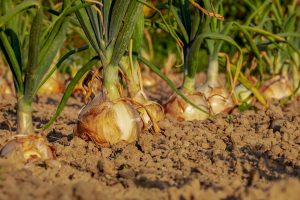Heavy and unseasonal rainfall in Maharashtra, Karnataka, Madhya Pradesh, and other onion-producing Indian states has sent onion prices climbing to highs not seen since 2013. The rise in onion prices is a distressing new challenge for Prime Minister Narendra Modi as he continues to reel from India’s economic downturn. India’s economic growth rate has reached a six-year low, with many predicting an economic slowdown.
Onions are a staple in most South Asian dishes. Historically, onions in India have brought down governments, like the fall of the Delhi and Rajasthan state governments in 1998. It was high onion prices in 1980 that helped Indira Gandhi win control of the central government — what many have since called the “onion election.”
Given domestic pressures and demand, the Indian government imposed a ban on the export of onions in late September. Additionally, it has announced that it will be importing 100,000 tonnes of onions from Afghanistan, Turkey, Iran, and Egypt.
Ties between India and Turkey have cooled down since Turkish President Recep Tayyip Erdogan spoke in favor of Pakistan at the United Nations General Assembly on India’s scrapping of Article 370 in Kashmir. “One of the problems to which the international community still does not devote enough attention is the Kashmir conflict, which awaits a solution for 72 years,” said Erdogan in October at the assembly.
India reacted by deferring Modi’s visit to Ankara. Further, New Delhi barred Turkish firm Anadolu Shipyard from doing defense-related work in India and canceled its $2.3 billion tender with Hindustan Shipyards Ltd. It also followed up with a tit-for-tat response on Turkey’s involvement in Syria.
However, the looming onion crisis has sent the incumbent government back to Ankara. India’s Price Stabilization Fund Management Committee (PSFMC) floated tenders on November 22 for import of 11,000 metric tonnes of onion from Turkey, reports The Print. Just a day before, on November 21, Turkey had hosted an international conference that severely criticized India’s actions in Kashmir, particularly the revocation of Article 370.
While External Affairs Minister S Jaishankar, in his recent Ramnath Goenka Lecture in New Delhi, might be right about the rapid evolution of Indian foreign policy, when it comes to commodities economics continues to be the major deciding factor.
India’s onion export ban is likewise upending traditional foreign policy affinities. Almost 75 percent of Bangladesh’s onion imports come from India. The export ban has sent prices in Bangladesh to around 220 Bangladeshi takas (around $2.50) per kilogram. In her last visit to Delhi in October, Bangladeshi Prime Minister Sheikh Hasina joked that “it has become difficult for us to get onions” and that she has asked her cook to make food without them.
Dhaka has been urgently importing onions by air from Myanmar, Turkey, China, and Egypt. After the ban, Bangladesh has also decided to import from Pakistan. This will be the first time in almost 15 years that Bangladesh imports onions from Pakistan, reports The News International. The first shipment has arrived by air to Dhaka on November 20, 2019.
The diplomatic and trade relations between the two South Asian nations have never fully recovered since Bangladesh’s 1971 War of Liberation from Pakistan. The situation worsened further in the last decade after the International Crimes Tribunal of Bangladesh convicted nine POWs of war crimes during the 1971 War, including a death sentence for Jamaat-e-Islami’s leader Abdul Quader Molla.
Hasina’s Awami League has always enjoyed close ties with India, and Dhaka’s decision to import from Pakistan came as a surprise to many. Nonetheless, with the staple vegetable’s prices soaring, Dhaka’s “onion diplomacy” may foster better relations between the two estranged nations.
In the past, India has also relied on imports from neighboring Pakistan, like in 2010 when onion prices skyrocketed under then-Prime Minister Manmohan Singh.
Bansari Kamdar is a freelance journalist and researcher presently based in Boston, MA. She is currently pursuing a post-graduate degree in Applied Economics and has an MA from Boston University. Her work has appeared in outlets like CNN-News18, The Quint, and The Diplomat.

































